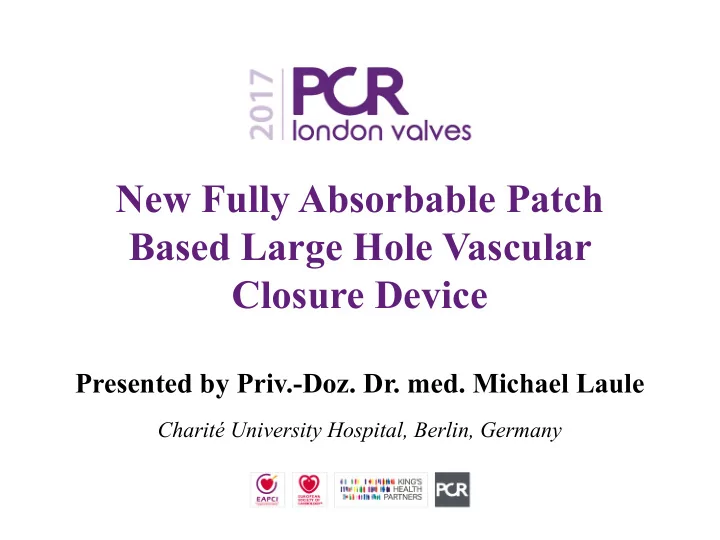

New Fully Absorbable Patch Based Large Hole Vascular Closure Device Presented by Priv.-Doz. Dr. med. Michael Laule Charité University Hospital, Berlin, Germany
Potential conflicts of interest Speaker's name: Priv.-Doz. Dr. med. Michael Laule q I have the following potential conflicts of interest to report: Affiliation/Financial Relationship Company • • Grant/Research Support Vivasure Medical
Primary Drivers of Clinical Need Desired Approach: TAVR TEVAR Fully percutaneous EVAR Easy to use ECMO Safe and secure Fully bioabsorbable Challenge: Complications associated with currently available large hole closure devices
Fully absorbable patch based Simple operation (OTW) Indicated 18F - 24F arteriotomies No suture, collagen or metal components Absorbed fully within 180 days in animal model
Pre-clinical Histopathology: 30-180 days post implantation Implant Implant Implant Absorbed Encapsulated absorbing and extra-arterial Cross-section Cross-section Cross-section @ 32 days @ 91 days @ 180 days Porcine abdominal aorta – luminal surface 22F Arteriotomy Complete absorption Implantation site Implantation site undifferentiated from native arterial wall No granuloma/scaring Longitudinal histology @ No perivascular fibrosis 162 days
Frontier III - Multi-centred European Clinical Study Aim of the Study: Assess the safety and clinical performance of a new fully percutaneous patch based synthetic absorbable Large Hole Closure Device (18-24F). Method: 50+ patients undergoing large bore femoral percutaneous access for TAVI, EVAR and TEVAR, prospective, non-randomized in 6 European centres Assessment of puncture site with DUS/CT at discharge, 30 days, 90 days and 1 year Primary endpoint: Incidence and severity of major complication rates directly related to the VIVASURE CLOSURE DEVICE up to 3 months from implantation (as defined by VARC-2) is no worse than those associated with cut-down or suture based closure devices of 14.7%
Frontier III - Clinical Case Primary Procedure: TAVR with Edwards Sapien 3 Device 29mm Valve Closure Procedure: PerQseal Device 21F Closure
Frontier III - Results 62 subjects (70 closures) completed across 6 European centers Follow-up Subjects Procedures No. Discharge 62 TAVR 42 3 Month 59 EVAR 24 12 Month 42 TEVAR 4 Mix of devices and sheath sizes across procedures No device related major vascular complications (VARC-2) 97% technical success 3 minor device related complications (haematoma, asymptomatic stenosis and pseudoaneurysm No late minor or major device related vascular complications No clinically significant changes on ultrasound or CT-Angiogram
NEXT STEPS Build clinical experience Indication expansion – (Frontier IV study) Post market – registries EU commercialisation Prepare for US IDE study
Summary Easy to use device with low learning curve Patch-based, fully bioabsorbable implant Requires no pre-procedure steps Has clinically demonstrated its safety and effectiveness with excellent outcomes from discharge through 1, 3 and 12 month follow-up (120 patients in Frontier I, II and III) Device provides a real option for fully percutaneous closure with the potential to reduce hospital costs and procedure times
Recommend
More recommend